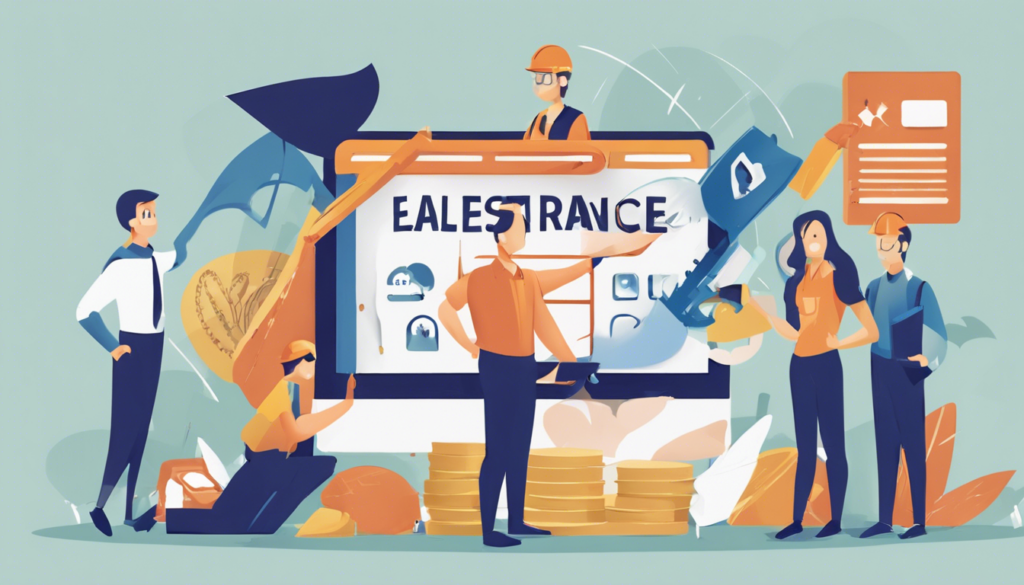General Liability Insurance
General liability insurance serves as an essential safety net for businesses of all sizes, offering a vital layer of financial protection against a wide range of potential risks that could arise during operations.
This comprehensive type of coverage generally includes protection against claims involving bodily injury, property damage, and advertising-related injuries that may result from your company’s activities.
By investing in general liability insurance, businesses can better safeguard themselves from significant financial losses caused by unforeseen accidents or legal claims.
Without adequate protection, a single lawsuit, unforeseen incident, or unexpected event could severely impact a company’s financial health, putting its stability, operations, and long-term future at significant risk. It’s not merely a wise decision for business owners seeking to safeguard their investments—it’s frequently a mandatory requirement stipulated in leases, business contracts, or agreements with clients and partners.
Ensuring comprehensive coverage shields organizations from potential authorized claims that could otherwise result in substantial financial and reputational damage.
That’s precisely where General Liability Insurance (GLI) comes into play. Whether you are managing a small business or overseeing a larger enterprise, securing this essential insurance coverage offers significant peace of mind.
It acts as a protective shield for your business, helping to safeguard it from potentially overwhelming and expensive legal disputes.
What is General Liability Insurance?
General Liability Insurance, commonly known as business liability insurance, serves as a crucial layer of protection designed to shield businesses from a wide range of common risks they might encounter.
This type of insurance generally provides coverage for claims related to bodily injuries or property damage that may occur on your business premises, during your daily operations, or as a direct result of your products or services.
By offering this financial protection, it helps businesses navigate unexpected incidents that could otherwise lead to significant expenses or legal challenges.
This specific type of insurance is carefully designed to assist in covering a wide range of potential costs, including medical expenses, legal fees for attorneys, and damages, in situations where you are found legally responsible.
Its primary purpose is to provide critical financial protection, ensuring that a single unexpected accident or incident doesn’t result in devastating financial consequences that could jeopardize the stability or future of your business operations.
General Liability Insurance, often referred to as GLI, serves as a critical safeguard for your business, offering protection against a wide range of potential claims. These include issues such as bodily harm, property damage, and even legal expenses arising from routine operations.
Such claims could originate from various sources, including customers, employees, or even random passersby. Essentially, this type of insurance acts as a safety net, shielding your business from unforeseen incidents that could potentially disrupt operations or lead to financial ruin.

A Simple Example:
To better understand the concept, imagine a café owner who knows the preferences of regular customers and greets them with their favorite drink ready to go. This level of personalization creates a sense of loyalty and satisfaction that keeps customers coming back.
Similarly, AI personalization in business insurance would involve algorithms that analyze a company’s specific risks and needs, tailoring coverage recommendations and policies that fit like a glove. This not only streamlines the process of obtaining insurance but also ensures that businesses are not overpaying for unnecessary coverage or underinsured against potential risks.
Imagine a buyer slips on moist ground at your retailer, gets injured, and sues you for medical bills. Without GLI, you’d have to pay out of pocket for authorized charges and any settlements, which might be financially devastating. GLI steps in to cover these prices so you’ll be able to give attention to operating your corporation.
Why Does Your Business Need General Liability Insurance?
Protection from Lawsuits
Without adequate general liability insurance, even a single lawsuit can be enough to cripple a small business financially. Legal fees, court costs, and judgment or settlement amounts can quickly add up, far exceeding what many businesses have readily available in cash reserves.
Furthermore, the reputational damage that can come from a lawsuit—whether the business is at fault or not—can significantly impact customer trust and future revenue streams. General liability insurance serves as a safeguard, ensuring that these unforeseen expenses don’t derail the hard work and investment you’ve put into your business.
No matter how cautious you are, accidents occur. Whether it’s a shopper injuring themselves at your premises or injury to another person’s property, GLI covers the surprising. It ensures you won’t have to bear the total monetary burden of a lawsuit.
Compliance with Legal Requirements
Many businesses are mandated by law to carry certain types of insurance, and general liability insurance often falls into this category. Without it, you could be operating illegally and face severe penalties, including fines or even the suspension of your business license.
Furthermore, having GLI can demonstrate to your customers and partners that you are a responsible and trustworthy entity, which can be crucial for maintaining and growing your business relationships.
In many industries and areas, general legal responsibility insurance coverage is not only a wise thought—it’s an authorized requirement. You could need proof of insurance to get an enterprise license or safe contracts with purchasers. Operating without it may lead to fines and even drive you to shut down quickly.
Building Trust with Clients and Partners
Having adequate insurance also serves as a cornerstone for building trust with clients and partners. When you demonstrate that your business is fully insured, it reassures them that they’re working with a professional entity that takes responsibility seriously.
This level of trust is crucial, as it can influence decision-making in your favor, ensuring that clients feel secure in their transactions and partnerships with you.
Being insured shows your customers, companions, and distributors that you take accountability seriously. It demonstrates that your corporation is dependable and ready for any bumps within the highway, which helps build trust and credibility.
Different Types of Liability Insurance: What’s the Difference?
General Liability Insurance vs. Professional Liability Insurance
Navigating the complex landscape of liability insurance begins with understanding the key differences between general liability and professional liability coverages.
General Liability Insurance, often considered the cornerstone of a business’s insurance policy, provides broad protection against claims of bodily injury, property damage, and advertising injury that can occur on company premises or as a result of business operations.
In contrast, Professional Liability Insurance, also known as Errors and Omissions (E&O) Insurance, is tailored specifically for professional service providers and covers claims of negligence, misrepresentation, or inaccurate advice that could lead to financial loss for a client.
Both types of insurance play critical roles in a comprehensive risk management strategy, safeguarding businesses from the varied risks they face in their day-to-day operations.
General Liability Insurance covers frequent dangers like accidents or property injury, and Professional Liability Insurance (Errors and Omissions Insurance) protects against claims of negligence or errors in your skilled services.
Example:
In addition to these fundamental policies, many businesses are now considering Cyber Liability Insurance, especially as they increase their digital footprint. This type of insurance is crucial in an age where data breaches and cyber-attacks are becoming more common.
It protects against the costs associated with recovering from a cyber-attack, including legal fees, notification expenses, and any regulatory fines that may be imposed.
A contractor would depend on GLI to cover an accident at a building site; a guide would possibly want skilled legal responsibility insurance to protect against giving an incorrect recommendation that costs a customer money.
Tenant Liability Insurance
Tenant liability insurance is designed to protect renters from financial losses if they are found responsible for causing damage to the rental property. This type of coverage is crucial for tenants who could face significant out-of-pocket expenses for repairs or legal claims made by the landlord.
It not only provides peace of mind but also helps to maintain a good relationship between tenant and landlord by ensuring that any accidental damages can be dealt with professionally and without personal conflicts.
If your corporation rents or leases property, tenant liability insurance protects you from damages prompted by the construction. Say your workplace unintentionally begins a fire that damages the building—you might be held accountable for the repairs. Tenant liability insurance ensures your business won’t have to foot your entire invoice.
Key Statistics: Why General Liability Insurance Matters
Understanding the importance of general liability insurance is underscored by the statistics that reveal the frequency and cost of liability claims. For instance, over 20% of small businesses will face a general liability claim at some point during their operation.
The average cost for slip and fall claims alone can exceed $20,000, while reputational harm claims can soar into the hundreds of thousands. Without adequate coverage, these expenses can devastate a business financially, emphasizing the crucial role that general liability insurance plays in safeguarding a company’s assets and longevity.
A report by Small Business Trends discovered that 43% of small businesses have confronted a possible lawsuit, and of these, 70% mentioned the case lasted over 12 months. Legal charges alone can climb into the hundreds, making GLI an essential safety measure for any business owner.
Given the protracted and costly nature of legal disputes, General Liability Insurance (GLI) not only acts as a financial shield but also provides peace of mind, allowing business owners to focus on growth and innovation rather than potential litigation.
Without GLI, a single lawsuit can derail years of hard work and investment, threatening the very survival of a small business. Therefore, investing in comprehensive GLI coverage is not just prudent, it’s a strategic move to safeguard the future of a business in an increasingly litigious society.
Another study by The Hartford found that the common price of a slip-and-fall claim is around $20,000. With no protection, even one incident might create a serious monetary setback for your corporation.
How to Choose the Right General Liability Insurance

Understand Your Industry
Assessing the specific risks associated with your industry is crucial when selecting the right general liability insurance policy. Different sectors face unique challenges and hazards, so it’s important to work with an insurer that understands the nuances of your business.
For instance, a construction company will require a different coverage focus compared to a retail store, due to the higher likelihood of on-site accidents and property damage.
Certain industries are more inclined to danger than others. For instance, a building firm could have greater legal responsibility risks than an advertising and marketing company. Make certain your policy reflects the unique risks of your industry.
Get the Right Coverage Amount
Assessing the appropriate amount of coverage is crucial for protecting your business against potential financial ruin. Underestimating the coverage you need can leave you vulnerable in the face of a lawsuit, while overestimating can lead to unnecessary premiums.
Work with an experienced insurance broker who can help you evaluate your business’s specific needs and recommend a policy that offers comprehensive protection without being cost-prohibitive.
While it’s tempting to go for the minimal protection to save on premiums, this might cost you extra in the long term. Discuss together with your insurance provider what level of coverage is sensible for your corporation based mostly on your measurement, property, and publicity to threat.
Bundle Policies for Better Deals
When considering insurance options, it’s also wise to explore bundling various policies. Many insurance providers offer discounts when you combine different types of coverage, such as property, liability, and business interruption insurance.
This not only simplifies your insurance management by consolidating multiple policies into one package but can also lead to significant cost savings, allowing you to allocate funds to other critical areas of your business.
Many insurance coverage suppliers supply bundled packages, so you’ll be able to mix GLI with different sorts of insurance coverage, comparable to property insurance or workers’ compensation insurance, at a lower price.
Common Misconceptions About General Liability Insurance
“I’m a small enterprise; I don’t want it.”
This belief can be particularly dangerous for small business owners. Just one lawsuit or accident can be financially devastating without the proper coverage. General Liability Insurance acts as a safety net, providing a layer of financial protection from claims of bodily injury, property damage, and even advertising injury that can occur during normal business operations.
It’s not just about the size of your business; it’s about the potential risks and ensuring you’re safeguarded against the unpredictable. You nonetheless face legal dangers if you happen to make money working from home or make use of an individual. A single accident might be sufficient to bankrupt a small enterprise without the right safety.
“It covers all the pieces, properly?”
Not quite. While a comprehensive insurance plan might seem all-encompassing, it’s crucial to understand the fine print. Many policies have specific exclusions and limitations that could leave you exposed in certain situations.
It’s imperative to review your coverage with a professional, ensuring that your policy is tailored to the unique risks associated with your business activities and personal circumstances.
General Liability Insurance doesn’t cover all the pieces. For instance, it won’t cover claims involving worker accidents (that’s what workers’ compensation is for) or damages to your property.
Frequently Asked Questions
1. What does General Liability Insurance cover?
General Liability Insurance primarily offers protection against claims of bodily injury or property damage that a business could be held legally responsible for. It also covers the costs associated with defending against these claims, including settlements or judgment awards.
Additionally, this insurance can help with the expenses related to libel, slander, or other advertising injuries that might occur in the course of conducting business. It covers claims associated with bodily harm, property injury, and private harm due to your corporation’s operations.
2. Is GLI needed for a home-based business?
While it may seem that a home-based business is less exposed to the risks that traditional brick-and-mortar establishments face, this is not always the case. Home-based businesses can still be subject to lawsuits arising from data breaches, client disputes, or advertising claims, which can be financially crippling without the right insurance in place.
Therefore, even entrepreneurs who operate from the comfort of their own homes should seriously consider the protections that General Liability Insurance (GLI) offers to safeguard their business endeavors against unforeseen legal challenges.
Yes. Even if you happen to run an enterprise from home, accidents can occur—like a supply person getting injured on your property or damage caused to a customer’s tools.
3. What’s the distinction between general liability insurance coverage and umbrella insurance coverage?
General liability insurance provides the basic level of coverage for common risks, such as bodily injury, property damage, and advertising injury. It’s the first line of defense for businesses against lawsuits and other financial liabilities.
In contrast, umbrella insurance offers an additional layer of protection that kicks in when the limits of your general liability policy have been reached, covering excess costs that could otherwise be financially devastating. This ensures that a single large claim doesn’t have the power to cripple your business.
Umbrella insurance coverage offers extra protection on top of your basic legal responsibility coverage, covering bigger claims that exceed your regular policy limits.

Conclusion: Why General Liability Insurance is a Must-Have
In today’s litigious society, where lawsuits can emerge from even the most unforeseen circumstances, General Liability Insurance acts as the first line of defense for your business. It provides the essential safeguard against claims of property damage, bodily injury, and the associated medical costs.
However, when the stakes are high and the claims surpass the limits of your standard policy, umbrella insurance becomes an indispensable asset, filling the gaps and securing your financial stability against potentially devastating legal judgments or settlements.
In a world where accidents can occur at any time, general liability insurance provides essential protection for your business. It’s not nearly masking authorized prices—it’s about having the peace of mind that comes from knowing you’re ready for no matter what life throws your way.
Understanding the nuances of general liability insurance can be the difference between a minor hiccup and a major financial setback for your business. This type of insurance covers a wide range of incidents, from customer injuries on your premises to damages caused by your products or operations.
By investing in a comprehensive policy, you ensure that your business can continue to thrive even in the face of unforeseen challenges, safeguarding not only your finances but also your reputation. Take the subsequent step and discover the very best basic legal responsibility policy for your business today!
Ready to Share and Promote?
As you venture into the realm of AI personalization, it’s crucial to understand its transformative potential for your business. By leveraging advanced algorithms and machine learning, AI personalization tailors the customer experience to individual preferences, behaviors, and interests, fostering a deeper connection with your audience.
This level of customization not only enhances user engagement but also significantly boosts conversion rates, providing a competitive edge in today’s dynamic market landscape. Embrace the power of AI personalization and watch your business soar to new heights of success and customer satisfaction.
Social Sharing: Share this text with your community and assist different business owners find out how to protect their firms with the right insurance coverage.

